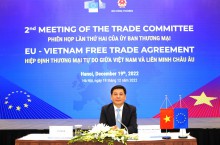The News
US, EU make efforts to solve inflation problem
The U.S. and the European Union likely will resolve some -- but not all -- of the EU’s concerns about the Inflation Reduction Act before certain controversial provisions in the law come into effect on Jan. 1, EU Commission Executive Vice President Valdis Dombrovskis said on Thursday.
The U.S. and the European Union likely will resolve some -- but not all -- of the EU’s concerns about the Inflation Reduction Act before certain controversial provisions in the law come into effect on Jan. 1, EU Commission Executive Vice President Valdis Dombrovskis said on Thursday.
During a briefing with EU lawmakers in Brussels about meetings with U.S. officials earlier this week, Dombrovskis said that a bilateral task force established to resolve the bloc’s concerns was expected to produce “output” before the end of the year.

“We're expecting the output from the task force, I would say, next week -- in any case by the end of the year,” he said.
Dombrovskis said the EU would “take stock” of that output and determine “what our options are to address the remaining problems.”
The bloc has said that sourcing provisions for tax credits in the bill violate the U.S.’ World Trade Organization commitments.
“[W]e will see to which extent our concerns are taken into account,” Dombrovskis said. “As some colleagues mentioned, it will solve some of our problems, it will not solve all of our problems.”
Earlier this week, Dombrovskis said he felt “slightly more optimistic” about prospects for resolving those concerns following discussions with top Biden administration officials during an U.S.-EU Trade and Technology Council meeting.
The Treasury Department is expected to issue guidance on its implementation of several tax credits in the bill -- including credits for electric vehicles that have spurred concerns from South Korea and Japan in addition to the EU -- by the end of the year.
Led by senior officials in the White House and the European Commission, the IRA task force was established in October to address the EU’s concerns, which extend to several tax credits for green technologies in the bill.
EU Commission Executive Vice President Margrethe Vestager warned during the briefing on Thursday that the IRA’s potential negative impacts on EU industry could be compounded by escalating energy prices in Europe -- a situation she said was spurring officials to “find ways to act and to act fast.”
“The combination of the means of the Inflation Reduction Act combined with a dramatic increase in the difference of energy prices creates a new situation,” Vestager said. An energy crisis driven by Russia’s war in Ukraine -- “Putin’s weaponizing of winter,” as she put it -- has made energy price differentials between the U.S. and the EU “quite dramatic,” she said.
In addition to seeking concessions from the U.S. via the IRA task force, Vestager said the bloc must take several actions internally, including boosting domestic support for green technologies as well as the “acceleration of the establishment of green capacity” in the EU.
“The greening of our energy production is what can lead to lower stable energy prices -- and that can take part of what is so toxic of the Inflation Reduction Act out of that act,” she said.
Bernd Lange, chair of the EU Parliament Committee on International Trade, said the bill was spurring serious concerns among EU companies about a drain on investment in the bloc. Some U.S. states, including Texas, he added, have launched what he described as “offensive advertising” touting subsidies as well as low energy prices and other advantages to EU companies.
Margaret Spiegelman (mspiegelman@iwpnews.com)



